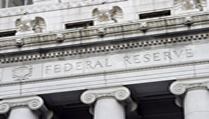 Despite its risks and the fact that it could syphon billions of dollars from the global financial system, the Fed still says that requiring initial margin for non-cleared over the counter derivatives makes the markets stronger.
Despite its risks and the fact that it could syphon billions of dollars from the global financial system, the Fed still says that requiring initial margin for non-cleared over the counter derivatives makes the markets stronger.
“Even in light of the significant costs of initial margin, it seems clear that some requirements are needed,” Federal Reserve Board Vice Chair Janet Yellen told the annual meeting of the American Economic Association. “A more robust and consistent margin regime for non-centrally cleared derivatives will not only reduce systemic risk, but will also diminish the incentive to tinker with contract language as a way to evade clearing requirements.”
According to an International Swaps and Derivatives Association study, those “significant costs” of initial margin could be between $1.7 trillion to $10.2 trillion. Ms. Yellen acknowledged this was an “eye-popping” number, but said that the Fed’s own study would “quantify the liquidity costs associated with initial margin requirements” (that study has not been released yet). But ISDA has contended that the increased amount of initial margin “will result in greatly increased demand for new funds at the worst possible time for market participants.”
The Fed currently endorses the framework put forth by the Basel Committee and IOSCO, the International Organization of Securities Commissions. This framework calls for the use of variation margin, which ISDA endorses, and more controversially, initial margin. Ms. Yellen explained in her speech, variation margin collateralizes current derivatives losses, while initial margin collateralizes future losses that could occur in the event of a counterparty’s default. “In essence, initial margin is a kind of performance bond,” she said. “In the event that a counterparty does not perform as required, the initial margin is used to replace the position with a new counterparty.”
While corporates got confirmation of their end-user exception to Dodd-Frank’s central clearing and trade execution mandate in November 2012, margin is still a big issue for corporations. The Commodity Futures Trading Commission (CFTC) has said that final margin requirements for uncleared swaps would be issued soon – as early as this month. But as of now the lack of guidance on margin and capital is hampering dealers’ attempts to set expectations for their clients and counterparties on terms, availability and pricing.
Ms. Yellen assured those in the audience that the Fed would make sure efforts at implementing regulation would account for the costs of new rules and “ensure that these costs are clearly outweighed by the benefits.”